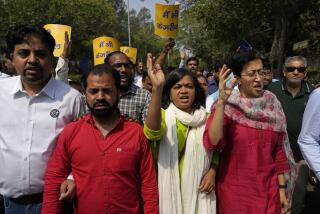Hurdles remain in forging a united anti-Musharraf front
LAHORE, PAKISTAN — Leaders of this country’s political opposition began taking the first steps Wednesday toward uniting against President Pervez Musharraf, who is facing widespread dissent after more than a week of emergency rule.
But the difficulties of overcoming internal divisions and the constraints of de facto martial law were quickly made clear with the arrest of one of Pakistan’s most famous figures, cricketer-turned-politician Imran Khan, at an anti-Musharraf student rally here that broke into factional fighting.
Pakistani opposition leaders are navigating a new political landscape after former Prime Minister Benazir Bhutto’s announcement Tuesday that she would not proceed with power-sharing talks with Musharraf.
Bhutto spent Wednesday contacting other parties “to try and forge a consensus on the minimal agenda of getting democracy restored and the people’s rights reinstated,” said Latif Khosa, a lawmaker with her Pakistan People’s Party. “Hopefully very soon there could be possibly a united national consensus.”
The former premier has been holed up with her aides in Khosa’s home in Lahore since Monday night. Rifle-wielding police served her with a seven-day detention order early Tuesday to prevent her from leading an anti-Musharraf motorcade from this eastern city to the Pakistani capital, Islamabad.
The challenge now is to stitch together an alliance of parties more accustomed to squabbling. Hostility toward Musharraf’s regime may be a common denominator, but the factions are a mixed lot, including both secular and religious groups, with leaders whose power bases are in different parts of the country.
Khosa said that Bhutto, previously a polarizing figure, had reached out to parties of all stripes, including an Islamist group whose ideology is in many ways antithetical to her more secular, pro-Western orientation.
A significant boost to her effort to form a united anti-Musharraf front came in positive comments from a longtime foe, former Prime Minister Nawaz Sharif.
“We are ready to set aside our differences with the People’s Party,” Sharif told Reuters news agency by telephone from Saudi Arabia, where he has lived in exile since Musharraf overthrew him in a military coup in 1999.
Musharraf declared a national state of emergency Nov. 3, assuming broad powers he said were necessary to suppress an insurgency along Pakistan’s borders, where Taliban and Al Qaeda sympathizers are known to operate.
But most of his security forces’ efforts since then have been focused on rounding up thousands of his critics, including lawyers, human rights activists and opposition party workers. Basic constitutional rights have been shelved, and media freedoms have been curtailed. Independent-minded judges in the Supreme Court have been replaced.
Over the weekend, under heavy pressure from the West, including Washington, which regards him as a key ally in its war on terrorism, Musharraf said he would hold parliamentary elections on schedule in early January.
The task of cobbling together an opposition alliance is a daunting one, as illustrated Wednesday by the arrest of Khan, the former cricket star.
Khan, a persistent Musharraf critic, was greeted like a pop star when he arrived on the campus of the University of the Punjab, where about 200 students were demonstrating against the government. Khan, 54, is widely admired by young people as a legendary athlete and philanthropist, if not for his recent foray into politics as head of the Movement for Justice party.
Within minutes, what had begun as a relatively unified anti-Musharraf protest turned into an ugly face-off between factions.
Khan was shanghaied by members of the student wing of the hard-line Muslim Jamaat-i-Islami party, who muscled him into a physics department building and locked him in. The Jamaat-i-Islami followers, who chanted, “God is great” and “God save this country,” said they objected to the presence on campus of an overtly political leader, who also happens to be relatively secular.
When Khan, flashing victory signs, was bundled into a white university van about an hour later, scuffles broke out between his supporters and Jamaat-i-Islami followers. At the university gate, the radical students handed Khan over to the police, from whom he had been hiding since the first night of the emergency.
Saif Niazi, an official with the Movement for Justice, said Khan was formally arrested and charged under Pakistan’s anti-terrorism law. His offense has not been specified.
Party officials said the group that helped corral Khan on campus may have included not just Islamist students but plainclothes members of Pakistan’s intelligence agencies, sent by Musharraf to sow discord among his opponents.
“He has been successful in dividing and ruling,” said Talat Naqvi, of the women’s wing of Khan’s party. But, echoing similar comments from Bhutto and other opposition leaders, Naqvi said that “this is the time we can unite.”
The U.S. State Department’s No. 2 official, John D. Negroponte, is due to arrive Friday for talks with Musharraf. He is expected to urge the general to end the state of emergency so that free and fair elections can take place.
--
More to Read
Sign up for Essential California
The most important California stories and recommendations in your inbox every morning.
You may occasionally receive promotional content from the Los Angeles Times.











